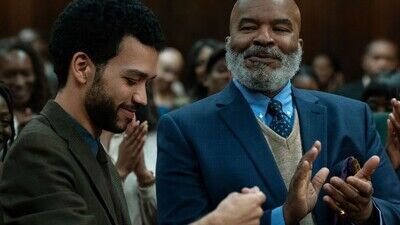Its intended spell is immediately jumbled: Aren (Justice Smith), a struggling visual artist, watches as white buyer after white buyer moves past his multicolor yarn sculpture before another confuses him for the help. The experience deflates Aren, an amiable and deferential young Black man who says sorry more than most Canadians. His pliability almost costs him his life when a drunk white woman asks for help with an ATM only to accuse him of stealing her purse. Luckily, Roger (David Alan Grier) saves Aren. Roger sees potential in the artist, inviting him into the magical society (its entrance is located in an unassuming barbershop). Once inside, we’re introduced to the group’s basic rules: Black people must make way for white fragility for fear that white anger will lead to murder; these Black folks are also expected to hide their sincere Blackness from the white person they’re serving. It seems, initially, that Libii is aware of the organization’s regressive respectability politics—the film hilariously lampoons “The Legend of Bagger Vance” and “The Green Mile”—but after a while you begin to question if the picture is in on the joke.
You also wonder about the scant world building: Outside of learning that 100 Black people are part of the group, which dates back to Monticello, we don’t learn much else. Are there other groups on other continents that represent the diaspora? The people in this society pull their power from one another (they can sense white people’s anger and sadness and fix it in a flash) but what is the actual power structure of the group apart from having a Black woman president? Aren is also a frustratingly thin character. Does he have family or friends? We get a brief reference to his white mother. But what of Aren’s other kin? For a film about protecting a community, there is nothing communal about it.
Aren’s loyalty to the organization is tested on his first mission. Roger assigns him to look after Jared, a white, self-important designer frustrated by his lack of upward mobility at the social media company. A few problems arise: Jason (Drew Tarvet) is a racist asshole who sees people of color as his footmen rather than as friends. Also, he’s romantically interested in Lizzie (a charming An-Li Bogan), a far more talented designer who Aren develops feelings toward. Now Aren must choose between keeping his white client happy and his heart. It’s an odd twist that forces both the film’s romance and politics to suffer. For every second we get with Lizzie and Aren navigating their feelings for each other and as people of color at a white company that cares little for them—the company’s facial recognition system literally doesn’t recognize their faces—we lose more time for “The American Society of Magical Negros” to make a sharp point about race.

